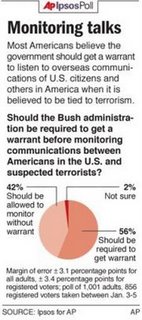Pen registers have been around for a while. A pen register is defined as a device that allows law enforcement to track outgoing calls on a particular phone.
In 1979, despite strong dissenting opinions, five members of the Supreme Court ruled in
Smith v. Maryland that the Constitution does not require the police to obtain a warrant for a pen register. The dissenting
concerns of Justices Stewart:
"noted that pen registers "reveal the identities of the persons and the places called, and thus reveal the most intimate details of a person's life." Justice Thurgood Marshall agreed, saying, "Many individuals, including members of unpopular political organizations or journalists with confidential sources, may legitimately wish to avoid disclosure of their personal contacts." "
An independent judge evaluates Government requests to grant
Pen Register Orders. The accepted standard for a pen register order is that the order must be relevant to an ongoing criminal investigation. The courts have concluded that the Fourth Amendment does not apply to pen registers or Trap and Trace Orders. Basically this means that the Government does not need to demonstrate probable cause.
According to
Smith v. Maryland, the numbers dialed into a phone at home is not private as the numerical information is conveyed to the phone company. The court held that the phone company records this information for “legitimate business purposes.”
According to a
Harvard website:
“The Court has not yet held that the content of those communications may be revealed without violating the Fourth Amendment. One could imagine, for example, an extension of the Smith rationale that the user knows when he dials he “conveys numerical information to the phone company” because he is using the phone company’s switching systems. Presumably, the user also knows that when he speaks, he is using the phone company’s lines and switching stations since the user must speak using the communication devices of his telephone service provider. However, The key distinction between (1) the “content” of the communication and (2) the telephone numbers dialed, time, length and date of call, has led one commentator to coin the phrase “communication attributes” to describe the latter. We will rely on this distinction as we consider the treatment of cyberspace communications.”
In 1996, law enforcement agencies in the U.S. Department of Justice obtained 4,569 pen register or trap and trace orders, authorizing the interception of dialed number information on the telephone facilities of 10,520 people. These statistics cover only the law enforcement agencies of the U.S. Department of Justice, not including other federal law enforcement agencies or state and local police (
Source).
Worth noting is that the USA PATRIOT Improvement and Reauthorization Act Of 2005 contains a Section 126, inserted by the House, that requires the Attorney General to submit a report to Congress "on any initiative of the Department of Justice that uses or is intended to develop pattern-based
data-mining technology."
The bottom line is that you should not expect any number you dial into your home phone to be private. There have also been reports that the NSA has the capability to monitor the actual content of a large scale of phone numbers as well. Most recently, a former employee of the NSA (Russell Tice)
alledges that the number of Americans subject to eavedropping by the NSA could be in the millions. According to a recent ABC news story:
"That would mean for most Americans that if they conducted, or you know, placed an overseas communication, more than likely they were sucked into that vacuum," Tice said.
The same day The New York Times broke the story of the NSA eavesdropping without warrants, Tice surfaced as a whistleblower in the agency. He told ABC News that he was a source for the Times' reporters."
Tice's credibility may come into question as he was recently let go from the NSA. I expect other reports may come up that shed more light on his possible motives for whistle blowing.
Clearly the Patriot Act expands law enforcement's ability to utilize tools at their disposal. The question becomes what picture is painted about you and would you ever know about it?
If you are interested in pen registers, here's some more information:


